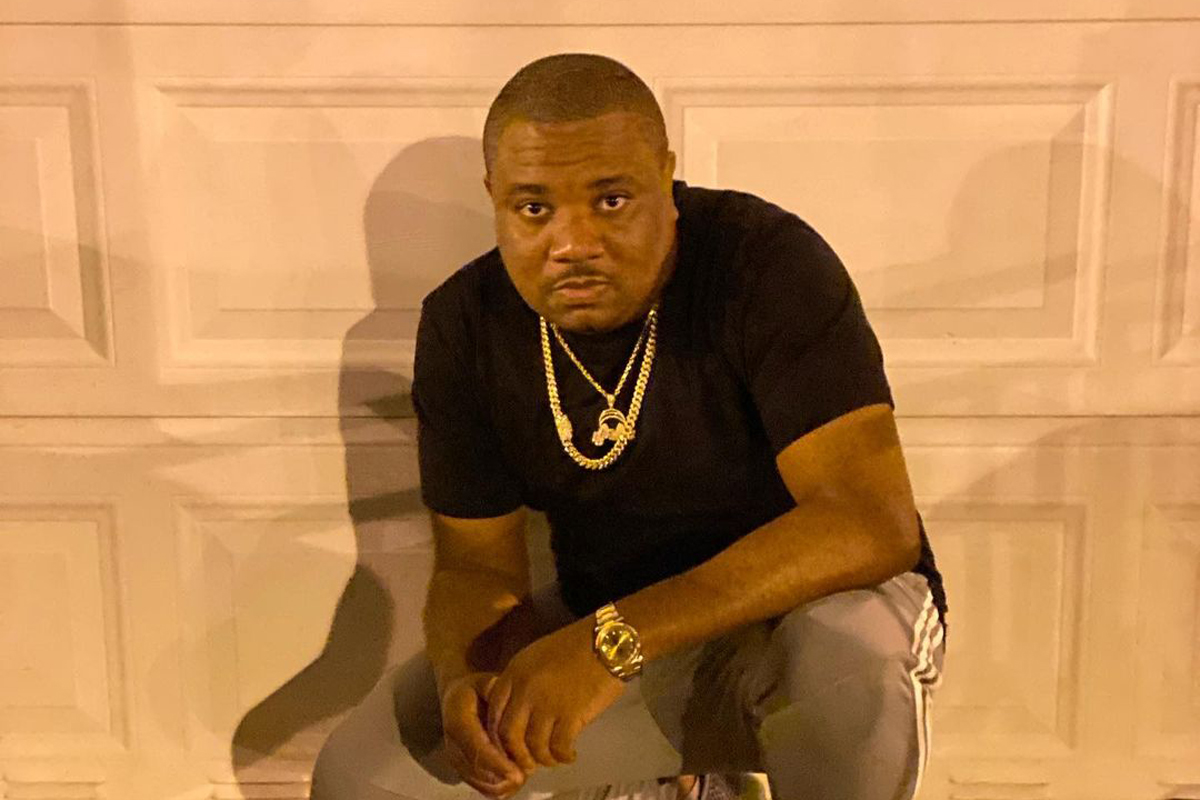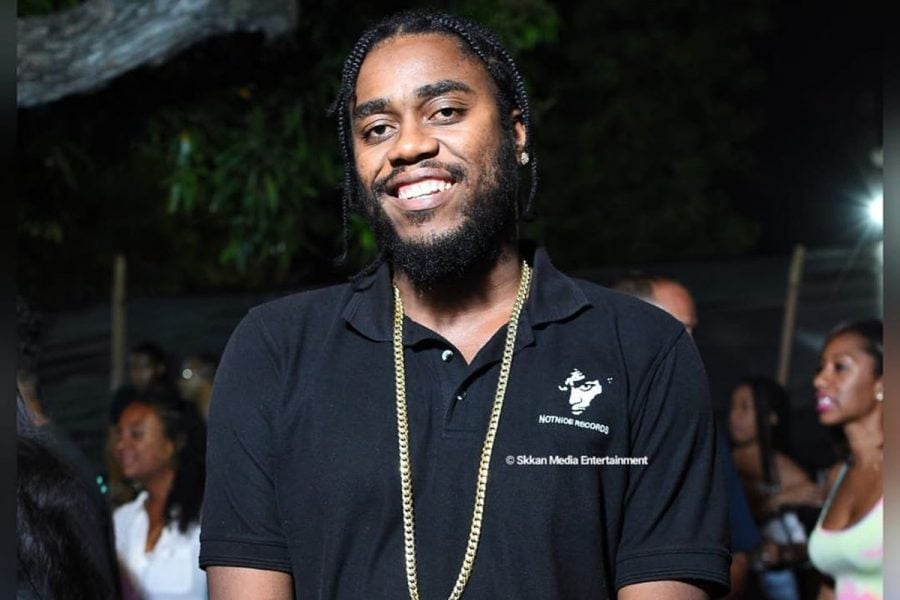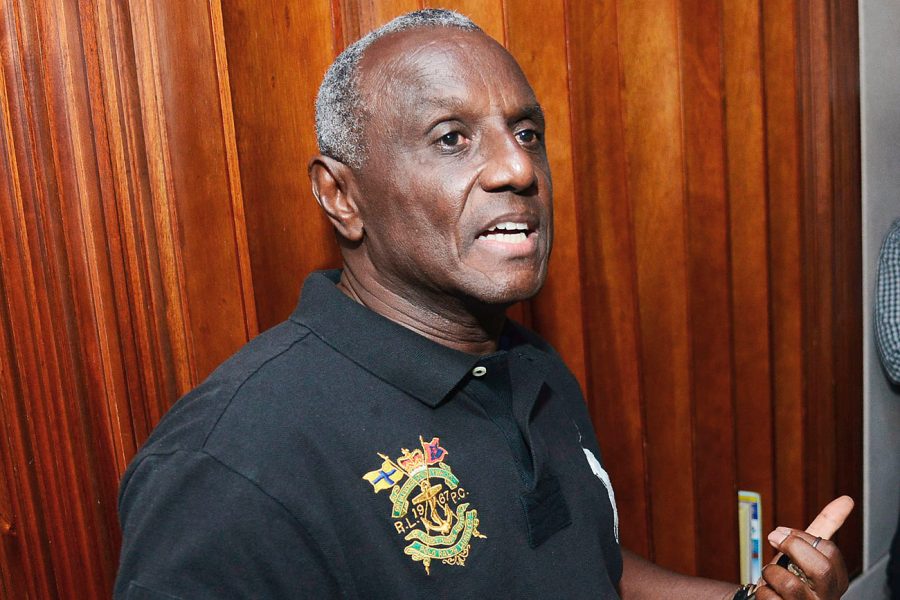DJ Frass Answers NotNice, Admits To Not Being The Maker Of His Record Label’s Beats

A ‘less-than-nice’ accusation made by Dancehall producer NotNice years ago about DJ Frass not being the creator of the riddims under his DJ Frass Records label, was admitted as true, after a cleverly administered line of questioning by Television Jamaica’s no-nonsense entertainment journalist Anthony Miller.
Miller’s pointed questions which he aimed at DJ Frass during an interview for Television Jamaica’s The Entertainment Report which was aired on Friday night, saw the record label founder buckling under the directness for which Miller is well-known, and admitting that he was not the composer of the beats put out by his label.
Frass had just finished responding to Miller’s questions about his relationship with Chimney Records, in which he said both he and Chimney’s producer Jordan McClure were still working together, having established a relationship from 2008, when he was ‘bowled for six’ by the veteran journalist.
“But Notnice went after you one time. Notnice say dat you don’t do the actual work in the studio,” Miller stated.
“Yeh, but hear wha a gwaan now Milla, mi write song. Yuh know much hit song me write?” DJ Frass responded.
“No, tell mi,” Miller responded instantly, then waited expectantly.
“Mi write a lot a songs for a lot of top artissiz. Right. Mi construct a lot a songs. Even if me don’t play a instrument, mi still contribute. An a man (beat maker) caan just sen a beat come gi mi. Ninety percent a di time, a me seh ‘yow, mi want dah vibe yah’ or mi wi just come suh or supppm, yuh understand?” DJ Frass said in an attempt to justify his actions.
However, Miller directed him back to the statements made by NotNice about him having no part in the creation of the riddims, many of which he has attracted notoriety for Frass including Clearance, Reggae Fest, Netflixxx and Road To Success, according to Spotify.
“He never said that. He (Notnice) said that you are not the one who build di riddims,” Miller re-emphasized, effectively cornering DJ Frass.
“Puff Daddy nuh build ridddim. Most a di man dem weh build riddim, weh part dem deh now to my level? TJ records and nuff odda big producer like – yuh have a lot a big producer like DJ Khaled. Yuh have a lot a big producers in Jamaica wseh dem nuh build riddim, but dem a big producer. Dem orchestrate everything; dem know weh dem want,” Frass proffered.

Miller then posed a question which further squeezed every last truth out of Frass, providing Notnice with vindication for his statements.
“So you are an orchestrator. You have the ear?” Miller asked.
“Yes,” Frass said meekly. “And listen to mi. Di most a dem weh build riddim, where are they now. Just tell mi. A 11 year me inna it now enuh.”
With DJ Frass now at his mercy, Miller quipped: “It took you this long to answer Notnice?”
“No. Me an Notnice nuh have no problem. Me an Notnice good now; wi nuh have no problem,” Frass said of the Kyng Midas producer.
https://www.instagram.com/p/CNQpctYHZa5/
DJ Frass has been credited by platforms such as Spotify as an “internationally acclaimed Jamaican producer” who is “the force behind some of the most popular and influential Dancehall riddims of this decade such as Clearance, Reggae Fest, Netflixxx and Road To Success”.
However, Frass’ cavalier reference to beat makers’ impecunious financial status versus his own commercial success, during the Television Jamaica interview, may just have a boomerang effect.
In a January 2017 Gleaner article, veteran music producer Gussie Clarke said it was against the law for producers to claim music created by beatmakers as their own, as Copyright Law gives clear protection to composers of beats and other types of intellectual property.
Clarke also called on the offending producers to “quit while they are ahead” as “time will catch up with them for their unjust actions”.
Clarke had told The Gleaner that although the problem was not new, it had the escalated in recent times, “with beat makers growing extremely frustrated with the way they have been treated by producers”.
“It has been going on for quite some time now and it is just a wicked criminal act. They are stealing people’s works, and not only are they not giving these people any credit, but they are also not giving them any of the earnings from these projects,” Clarke had said.
“Many of these persons (beat makers) are approached by these producers and are asked to create a rhythm for them. He (the beat maker) then sells them the rhythm. But what he has sold is the master, which is the right to take that rhythm and voice as many people on it as he (the producer) wants,” Clarke had explained.
“He has not sold his copyright. Some producers don’t know this and think they bought the copyright. The copyright is not transferable by word of mouth. It has to be contractual,” he said.

Clarke had also recommended that beatmakers get experienced music publishers on their teams, as many of them who believe that they have sold their rhythms still have their copyright as creators, and could capitalize on earnings being generated from the use of their work.
“Automatically in law, as the creator, this person owns the beat. It is a fact that after ‘buying’ some of these rhythms these producers go behind the backs of the beat makers and register the work as their own,” he had explained.
He also said that if beat makers are serious about being compensated for their intellectual property, the matter can easily be resolved in court.
“If I’m the creator of something, it’s easy to prove. All I need to do is describe how I put this thing together from scratch and have physical proof to back it up,” Clarke had pointed out.
Noting that the matter was not just a local matter, Clarke said beat makers need a good music publisher with international affiliation to enable the riddim to be “registered in every country and every database in the world”.
“Once that is done, when anybody wants to use your work, whether it is a song that has gone international using your beat, you will be compensated as the composer,” he said.
Clarke also said that as creators, beat makers are the ones with the ultimate say in who earns from using their work.
“The law does not question you, if you are the creator. Anybody else who wants to use your work must get permission, and nobody can tell you what they want to give you for it,” he declared.
“No producer can tell any beat maker, who is the creator/ composer, that ‘Oh, mi a gi yuh a change from dis’. No, he does not have that right. What he can say to you as the creator is, ‘Can you give me a share of your copyright?’” Clarke advised.
He also encouraged composers to look at the larger picture and not just dollar signs when negotiating deals involving their creative works and warned them that while they may “give away a portion of your copyright, not to “give away everything”.
